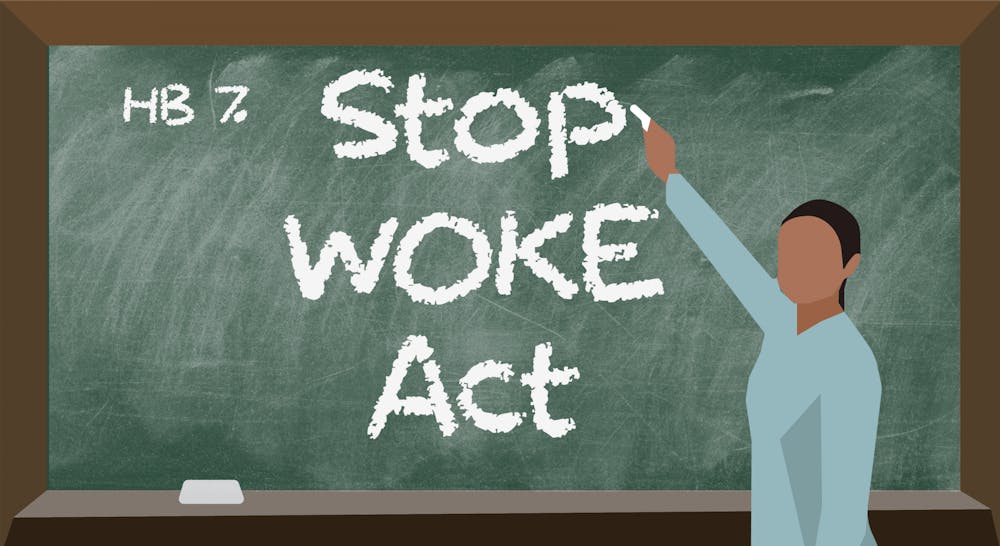Jeffrey Adler, a UF history professor, is somewhat of an expert in uncomfortable conversations — conversations that could be outlawed under a new state law.
“My classes deal with the history of the criminal justice system and race in American history,” Adler said. “It’s difficult to discuss that without raising topics that are likely to make everyone in the room in some way uncomfortable.”
House Bill 7, dubbed the “Stop WOKE Act” by Gov. Ron Desantis, went into effect July 1, 2022. The law is an expansion on Florida Statute Section 760.10, now including language that prohibits certain material from being taught at universities in the Florida State University System.
The material includes anything that “espouses, promotes, advances, inculcates, or compels [students] to believe” a list of concepts, including a person being thought of as inherently racist or sexist, as well as asserting that some people are privileged or oppressed.
The law comes after nationwide controversy over critical race theory, a discipline often found in higher education that seeks to explain the way in which prejudice and racism are systemic within the legal field according to the Legal Defense Fund.
UF administration has not been transparent with faculty on how complaints will be handled and what constitutes a violation, Adler said. He now worries the law will become a “political weapon.”
Under the law, violation complaints are student-driven, Adler said, meaning students are the ones filing complaints against instructors.
To file a complaint, a student must enter their UFID, basis of complaint, witnesses and desired outcome, according to the Chief Diversity Officer website.
In the case of a substantiated claim, the website states the Board of Governors will be informed and potentially take disciplinary measures such as termination of a faculty member. If substantiated violations are found against UF, it could lose performance funding for the next fiscal year.
In Adler’s three decades of teaching, no student has likened course material to indoctrination.
“I don't have very much faith given how poorly written the law is and how non-transparent the process is,” Adler said. “The problem is that the law, and not necessarily the university, is basically priming people to find violations, and the violations are not defined.”
In a statement from UF spokesperson Cynthia Roldan, she said UF will follow the new state law.
“We are confident the university will adhere to the law while providing students the opportunity for exposure to a full spectrum of ideas, opinions and beliefs.”
Since its adoption, students and faculty have expressed concerns over the law.
Aron Ali-McClory, a UF Young Democratic Socialists Chair and political science sophomore, said the law was a ploy by Desantis.
“Just judging from the title, I immediately knew that it was just another item in the culture war for DeSantis to put forward as meat for his base,” he said, “My reaction was disbelief because he is just putting forward something that's not going to help anybody. It's going to hurt education.”
Ali-McClory added he has heard from classmates about professors increasing their level of cautiousness when approaching topics like critical race theory, and UF administration’s track record with academic freedom will only get worse, citing UF’s past refusal to allow professors to testify against the state.
“The Republican Party of Florida wants to destroy education. If they have an uneducated voter base, it's easier for them to get people to buy into their lies and their misinformation,” he said. “With the passage of this law, I think you're going to see more crackdown on intellectual diversity, which is funny because that's exactly what Desantis claims he doesn't want.”
Jackson Rowell, public relations vice president of UF Young Americans for Freedom, wrote in a statement that HB 7 is crucial to upholding democracy. He said critical race theory was “detrimental to the fabric of our republic.”
Roberto Zaldaña-Argüello, a 22-year-old UF computer engineering junior, said the bill promotes free speech and diversity of thought.
“If you're in an echo chamber your entire life and you're brought up to believe that one side of the political aisle is reprehensible, it's absolutely destructive,” Zaldaña-Argüello said.
Jerry Edwards, a 31-year-old staff attorney for the Florida American Civil Liberties Union, said he believes professors need to be careful when addressing certain topics.
Because of the student-driven complaint process, he said it would be fairly easy for students with bad intentions to take a professor out of context and get them in trouble.
While the legislation is unique in terms of its application to university students, Edwards believes there’s been a nationwide effort within legislation on the topic of critical race theory. College students have more free speech protection than that of K-12 students because of the expectation of broader and more mature discussions, he said.
The Florida ACLU filed a suit against the State of Florida over the law in August. On Thursday, a federal judge blocked portions of the law concerning limitations on private employers’ use of diversity and sensitivity training.
Less than a month after HB 7 was signed into law, UF also sent out a survey entitled “Intellectual Freedom and Diversity of Viewpoints” on behalf of the Florida Board of Governors. It asked students and faculty a series of questions regarding intellectual freedom in universities.
With an overall response rate of 2% across Florida public universities, UF student response rate was 4.2% or 2,722 students of 64,846, according to the results of the survey. Critics of the survey claimed it was an attempt to gauge how politics played out in the classroom, including questions such as “My professors are generally more (conservative, liberal, other, or don’t know).”
The Board of Governors is currently adopting guidelines in regard to HB 7’s application across the university system, which UF will adopt when it is complete.
Contact pharris@alligator.org. Follow her on Twitter @peytonlharris.

Peyton Harris is a third-year English major and Senior News Director for the Alligator. In her free time, she likes to doomscroll on Twitter and crochet.






